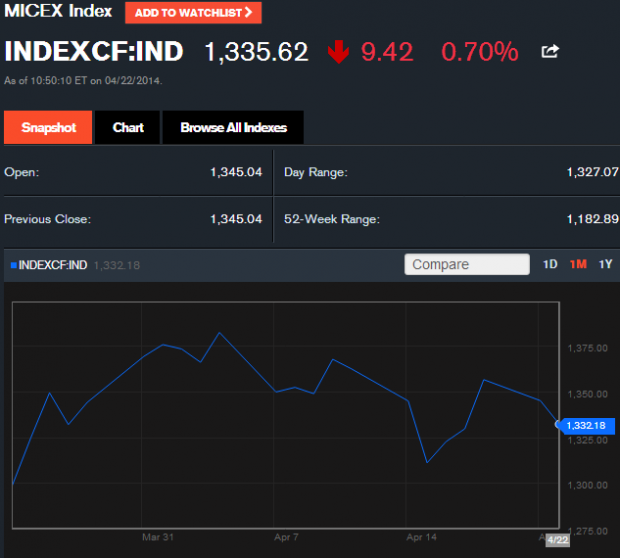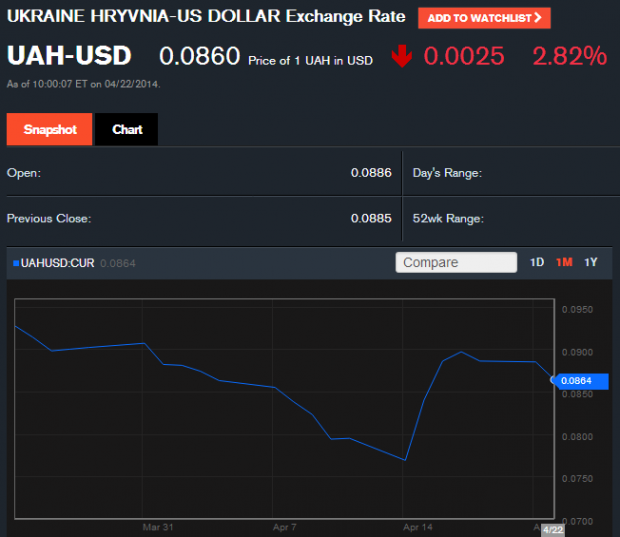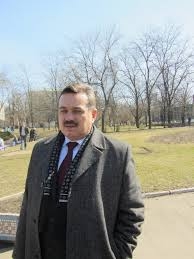U.S. Vice President Joe Biden is in Kiev today and is scheduled to meet with the leaders of the interim government. Meanwhile, separatists have captured more buildings, and Russian and the West continue to escalate the rhetoric, each blaming the other for an increasingly tense standoff.
Yesterday’s liveblog can be found here. For an overview and analysis of this developing story see our latest podcast.
Please help The Interpreter to continue providing this valuable information service by making a donation towards our costs.
An interactive map of the situation:
View Ukraine: April, 2014 in a larger map
For links to individual updates click on the timestamps.
Below we will be making regular updates. Be sure to check back often and hit refresh.
In a web chat hosted by the Atlantic Council today, Valentyn Nalyvaichenko, the head of the Ukrainian Security Service (SBU), claimed that there are as many as 100 Russian military intelligence or special forces officers operating in Ukraine at the moment.
Nalyvaichenko said that separatist actions in Slavyansk were being lead by a group of 30 GRU officers, lead by Colonel Igor Stelkov, who the SBU claimed to have identified via phone recordings on April 14. Nalyvaichenko said today that the SBU has arrested and is interrogating three GRU officers, currently being held in Kiev. The SBU chief described an extensive network of Russian subterfuge in Ukraine:
“For the last – we now understand — two or three years,” officers of Russia’s GRU “have created very covert but well-structurized networks with agents, with pro-Russian organizations, involving in such illegal activity many Ukrainians,” he said. Those networks are most developed in Crimea, which Russia seized and annexed in March, and in eastern Ukraine, Nalyvaichenko said. “Russian military officers … are the main provocateurs and main organizers” of the uprisings in the east, recruiting sympathizers and paying local criminal gangs to help attack local governments. “We for sure know now who are they, I mean those Russian officers,” Nalyvaichenko said. “They are very dangerous, well armed, [and] for years before prepared to do what they are doing now.”
Nalyvaichenko also mentioned that he was satisfied with the “intensive” and “well organised” intelligence cooperation with the United States. Other topics of discussion include the relationship between economic hardship and propaganda in the eastern regions, the difficulties Ukraine has had in responding to the Russian threat, and Ukraine’s hopes for help from international monitoring missions.
The Facebook post appeals for help from supporters after announcing that the building in Krasnodon was occupied following a rally at 16:00 local time today. Barricades were reportedly set up at 23:00. The post says that the protesters’ demands are an increase in wages and the “lifting of sanctions on workers”.

The Krasnodonugol mine has faced criminal investigation in the past for safety violations following the deaths of 16 miners in an explosion in 2011.
Galeotti and Bowen argue that Putin has revived a kind of Russian imperialism that has deep roots in history but which has been dormant, and Russia’s imperialist expansion is an offshoot of Putin’s ideology.
Putin has spent considerable effort in forging a new Rossiiskii state nationalism. Absent is the visceral anti-Semitism of the Russian Empire, and the widespread racism and hostility visible within much of Russian society is not reflected in government policy. Nor does the president seem interested in expanding direct Russian rule (as opposed to political authority) or in exporting any particular political philosophy to non-Russians. At the same time, Putin thinks that “the [ethnic] Russian people are, without a doubt, the backbone, the fundament, the cement of the multinational Russian people.” In other words, though ethnic Russians do not rule the state, they do provide the foundations for the “Russian civilization” on which it is based.
Putin’s reference to Russia as a “civilization” signals itself a return to the time-honored belief that there is something unique about Russia rooted not only in ethnic identity but in culture and history — a belief that began when the country became the chief stronghold of Eastern Orthodoxy after the fall of Constantinople. As he put it in his 2012 state-of-the-federation address: “In order to revive national consciousness, we need to link historical eras and get back to understanding the simple truth that Russia did not begin in 1917, or even in 1991, but, rather, that we have a common, continuous history spanning over 1,000 years and we must rely on it to find inner strength and purpose in our national development.”
Ukraine’s acting president has called for the relaunch of “counter-terror operations” aimed at removing pro-Russian separatists from government buildings. Turchinov cited the discovery of several bodies as the reason for the move, and he blamed Russia for the deaths. Reuters reports:
Oleksander Turchinov, in a statement, said that “brutally tortured” bodies had been found near the city of Slaviansk, which is in the hands of pro-Russian militants. One was that of Volodymyr Rybak, a member of Turchinov’s Batkivshchyna party, who had recently been abducted by “terrorists”.
“These crimes are being carried out with the full support and indulgence of the Russian Federation,” he said. “I call on the security agencies to relaunch and carry out effective anti-terrorist measures, with the aim of protecting Ukrainian citizens living in eastern Ukraine from terrorists.”
As we’ve been reporting, Simon Ostrovsky is being detained by separatists who report to the newly, and self-proclaimed, mayor of Slavyansk. Mashable adds this statement from Vice News:
In a statement sent to Mashable and posted on its website, a Vice News spokesman said the media organization is in touch with the U.S. State Department and working to secure their reporter’s safety: “VICE is aware of the situation and is in contact with the United States State Department and other appropriate government authorities to secure the safety and security of our friend and colleague, Simon Ostrovsky.”
Some additional context.
Simon Ostrovsky, whose dispatches from Crimea and eastern Ukraine have been invaluable, has reportedly been captured by pro-Russian gunmen in Slavyansk. We have translated the announcement published on Gazeta.RU:
The “People’s mayor” of Slavyansk, Vyacheslav Ponomarev, said that the militia has taken the American journalist, Simon Ostrovsky, hostage, reports a correspondent for Gazeta.ru,
Ponomarev announced this during a press conference at the House of Culture in Slavyansk.According to him, Ostrovsky has dual US and Israeli citizenship and works for the American publication, Vice.
The press conference was briefly interrupted when the journalists’ parents rang Ponomarev, the leader of the Slavyansk militia, who gave assurances that their son was doing well.“Nobody abducted him, nobody is holding him hostage, he’s with us now in at the SBU, preparing material and working,” said Ponomarev.
The official statement from the Ukrainian Defence Ministry says that a Antonov-30 suffered several bullet holes from small arms fire, though it has been repaired.
Ukraine and Russia have several agreements that allow Ukraine to conduct aerial photography and surveillance on both sides of the border, though several border patrol and surveillance aircraft have been shot at since the Yanukovych government was removed in February.
Two economies are vital to understanding how this crisis will play out. The first is Russia’s. As world investors are deterred by Russia’s actions, and as world powers threaten to pass more sanctions against Russia, it is important to watch how Russia’s economy deals with the negative fallout.
For the second day in a row Russia’s MICEX index closed lower, losing .7% of its value. The index is now nearly as low as it was on March 27th. All of April’s gains have been erased.

Bloomberg reports that Russia may be in a “technical recession,” and adds, “equities on the Micex trade at 4.9 times estimated earnings, the cheapest valuations among 21 developing countries monitored by Bloomberg.”
Ukraine’s economy continues to struggle. The hryvnia gave back part of its gains from the last week, as it dropped 2.82% against the dollar. Clearly, there are continued worries that Ukraine cannot stand up to its far larger and more aggressive neighbor.

In a televised speech, Russian Prime Minister Dmitry Medvedev said that his country is prepared for more sanctions and can weather the storm. Voice of America reports:
The prime minister said he is confident his government will be able to minimize the consequences of sanctions and that it will act under what he calls new conditions. He assured lawmakers that Russian industries that rely on support from other markets would get it from the government.
He said Russia has no plans to ease trade with the European Union, but pointed out that thanks to cooperation with other markets, Russia can minimize its losses.
Izvestia reports that all employees of Russian security agencies will be banned from travelling abroad. The decision is possibly another hedge against sanctions that could eventually find some of these employees banned from travelling anyway. It’s also possible that some of them could find their assets frozen or even confiscated — and the U.S. and its allies sometimes announce new sanctions without announcing who is affected. The move also comes after the Russian Foreign Ministry advised its citizens not to travel to the United States or any countries that extradite to the U.S. for fear of being detained or abused as retribution for this crisis.
Below The Interpreter has provided a translation of the Izvestia report:
Employees of Russian security agencies have been banned from travelling abroad. The entire staff of the Ministry of Internal Affairs, Federal Migration Service, Federal Drug Control Service, Federal Penitentiary Service fall under the ban, as well as some of the personnel of the Ministry of Defence.
From April 21, silovki will not be able to leave the territory of the Russian Federation, but officers will, in the near future, be allowed to travel to certain states.
A list of states to which agency staff will not be able to travel to, which appears to have been drawn up by the Ministry of Internal Affairs, has been made available to LifeNews. It is a total of 150 countries.
So, on the tourism blacklist for silovki were Turkey, Bulgaria, the UK, the USA, Japan, Mexico, Italy, Egypt, Spain, the Czech Republic and Cuba.
There are more than 4 million people in Russia’s security agencies. The total number of employees in the Ministry of Internal Affairs is about 1.325 million, in the Ministry of Defence – 2.02 million, the Penitentiary Service – 325.5 thousand, the Drug Control Service – 40 thousand. The judiciary is 30 thousand strong. There are approximately 23 thousand court bailiffs, 63 thousand prosecutors, of whom 20 thousand work in the Investigative Committee. 34.5 thousand personnel are listed at the Migration Service and 166 thousand with the Tax Service. Because of secrecy, it is difficult to add up the exact numbers of employees of the Federal Protection Service [equivalent to the US Secret Service], FSB and military intelligence. The figure is estimated at around 250 thousand.
The Ukrainian government is once again unveiling new evidence that Russian special forces are active inside Ukraine and are openly seeking to both destabilize the country and eventually capture Ukrainian military installations. Kyiv Post reports:
At a briefing on April 22, Ukrainian Security Service (SBU) spokesperson Maryna Ostapenko blamed Russia for the building seizures and armed assaults, and accused it of violating a de-escalation agreement that was brokered in Geneva last week by diplomats from the U.S., European Union, Ukraine and Russia.
Ostapenko added that there is mounting, irrefutable evidence of Russian special-ops troops and military intelligence personnel engaged in operations in eastern Ukraine.
That report goes on to list more attacks or incidents across Ukraine that occurred during the Easter weekend, as well as arrests made and equipment captured by Ukrainian law enforcement. The SBU appears to be stressing that their military and Interior Ministry positions have been under increasing surveillance and/or attack over the last week.
As far as irrefutable evidence is concerned, if Russian troops are operating inside Ukraine, and there is evidence that they are, they are being far more careful than they were in Crimea, where the presence of Russian troops was obvious.
But evidence is growing, even if there is no smoking gun. CBS’s report from Slavyansk last night was revealing, as separatists admit some of the gunmen are “friends” from Russia, and one of the gunmen responds to questions about his nationality with a strange reply: “I’m just a person.”
Joe Biden, the U.S. Vice President, has reaffirmed his country’s support for the interim government in Ukraine. AFP reports:
The United States is standing by Ukraine in the face of “humiliating threats” ahead of a crucial presidential election next month, US Vice President Joe Biden told legislators in Kiev on Tuesday.
“You face very daunting problems, and some might say, humiliating threats,” Biden said, adding that the poll set for May 25 could be “the most important election in Ukrainian history”.
Since then, Biden has reiterated that the United States will not recognize Russian actions in Crimea.
Instead of backing down on Monday, pro-Russian separatists doubled-down, taking more buildings and erecting more roadblocks. The Los Angeles Times reports:
In the town of Kramatorsk, in the north of the Donetsk region, pro-Russia separatists broke into a police station and kidnapped the police chief, online publication Kramatorsk.info reported.
In Luhansk, capital of the neighboring region of the same name, young separatists in masks and armed with sticks and baseball bats attacked a rally by supporters of Ukrainian unity, calling people “fascists” and “traitors” as they beat them, independent Channel 5 reported. Militants continue to hold the Ukrainian Security Service headquarters in Luhansk and have captured hundreds of firearms, the UNIAN news agency reported.
And in Slovyansk, scene of the Sunday shootout that left at least three dead, a fresh influx of gunmen set up roadblocks at key intersections and commercial sites, said reporter Denis Kazansky of the regional online publication Ostrov.
Pro-Russian gunmen also detained five journalists on Monday, two of them Ukrainian. The Associated Press reports that one Belarusian and two Italian journalists were briefly detained in Slavyank and were released after they produced press documents. Irma Krat, a journalist and activist who has been working closely with the Maidan movement, has been held in captivity since Sunday on suspicion that she is a “spy” who has played a role in “war crimes.”
With the rhetoric on both sides heating up, the pro-Russian gunmen show no signs of backing down. It’s hard to see any evidence that last week’s internationally brokered agreement has had any impact on the ground in Ukraine.
Reuters reports that Mustafa Dzhemilev, former chairman of the Mejlis of the Crimean Tatars and a Ukrainian MP, has been informed by Russia that he is banned from entering Russia (and Russian-occupied Crimea) for five years.
Dzhemilev was given the letter informing of this while crossing the border back into mainland Ukraine after spending the weekend in Crimea.
It carried a photograph of a typed sheet of paper, unsigned and without letterhead, headed: “Notification of non-permission of entry to the Russian Federation”. It said “Mustafa Dzhemilev … citizen of Ukraine” was denied entry to Russia on the basis of federal law for five years until April 19, 2019.
The Mejlis also announced that their current deputy chairman, Aslan Omer Kyrymly, had also been issued a notice barring him from entering Crimea.
Ukrainska Pravda reports that the chief of police in Kramatorsk was kidnapped last night by armed men:
In Kramatorsk last night, people, in camouflaged outfits with automatic weapons, took over the town police department.
According to Kramatorsk.Info, the chief of the department, Vitaly Kolupay, was taken off in an unknown direction.
[Vitaly Kolupay]
“The fighters, having captured the police department, demanded that they hand over their weapons to them. They behaved brazenly and brusquely”, notes the publication.
Meanwhile, according to RIA Novosti, a group of armed men entered the Ukrainian Security Service building in Kramatorsk.
“Negotiations are under way between the Security Service staff and the supporters of federalisation”, says their report.
They hung up the flag of the so-called People’s Republic of Donetsk at the gates of the SBU. Earlier, supporters of federalisation had picketed the buildings of the SBU, the police, and the military guards at the airport, demanding that they not participate in military operations against the militia.
They have already held onto Kramatorsk city hall for a week.
Here is video footage of the Kolupay being lead away as a crowd chants “The police are with the people” and “Donbass!”
